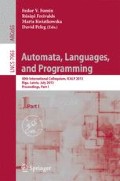Abstract
We consider the complexity of computing the determinant over arbitrary finite-dimensional algebras. We first consider the case that A is fixed. We obtain the following dichotomy: If A/rad A is noncommutative, then computing the determinant over A is hard. “Hard” here means #P-hard over fields of characteristic 0 and Mod p P-hard over fields of characteristic p > 0. If A/ rad A is commutative and the underlying field is perfect, then we can compute the determinant over A in polynomial time.
We also consider the case when A is part of the input. Here the hardness is closely related to the nilpotency index of the commutator ideal of A. The commutator ideal com(A) of A is the ideal generated by all elements of the form xy − yx with x,y ∈ A. We prove that if the nilpotency index of com(A) is linear in n, where n ×n is the format of the given matrix, then computing the determinant is hard. On the other hand, we show the following upper bound: Assume that there is an algebra B ⊆ A with B = A/ rad(A). (If the underlying field is perfect, then this is always true.) The center Z(A) of A is the set of all elements that commute with all other elements. It is a commutative subalgebra. We call an ideal J a complete ideal of noncommuting elements if B + Z(A) + J = A. If there is such a J with nilpotency index o(n/logn), then we can compute the determinant in subexponential time. Therefore, the determinant cannot be hard in this case, assuming the counting version of the exponential time hypothesis.
Our results answer several open questions posed by Chien et al. [4].
Work supported by DFG grant BL 511/10-1 and by the Indo-German Max-Planck Center for Computer Science (IMPECS). A full version is available as a preprint: Markus Bläser, Noncommutativity makes determinants hard. Electronic Colloquium on Computational Complexity (ECCC) 19: 142 (2012).
Access this chapter
Tax calculation will be finalised at checkout
Purchases are for personal use only
Preview
Unable to display preview. Download preview PDF.
References
Arvind, V., Srinivasan, S.: On the hardness of the noncommutative determinant. In: Proc. 42nd ACM Symp. on Theory of Comput (STOC), pp. 677–686 (2010)
Barvinok, A.: Polynomial time algorithms to approximate permanents and mixed discriminants within a simply exponential factor. Random Struct. Algorithms 14(1), 29–61 (1999)
Bläser, M., Dell, H.: Complexity of the cover polynomial. In: Arge, L., Cachin, C., Jurdziński, T., Tarlecki, A. (eds.) ICALP 2007. LNCS, vol. 4596, pp. 801–812. Springer, Heidelberg (2007)
Chien, S., Harsha, P., Sinclair, A., Srinivasan, S.: Almost settling the hardness of noncommutative determinant. In: Proc. 43rd ACM Symp. on Theory of Comput (STOC), pp. 499–508 (2011)
Chien, S., Sinclair, A.: Algebras with polynomial identities and computing the determinant. J. Comput. Sys. Sci. 67(2), 263–290 (2003)
Chien, S., Rasmussen, L., Sinclair, A.: Clifford algebras and approximating the permanent. J. Comput. Sys. Sci. 67(2), 263–290 (2003)
Dell, H., Husfeldt, T., Wahlén, M.: Exponential Time Complexity of the Permanent and the Tutte Polynomial. In: Abramsky, S., Gavoille, C., Kirchner, C., Meyer auf der Heide, F., Spirakis, P.G. (eds.) ICALP 2010. LNCS, vol. 6198, pp. 426–437. Springer, Heidelberg (2010)
Drozd, Y.A., Kirichenko, V.V.: Finite dimensional algebras. Springer (1994)
Godsil, C.D., Gutman, I.: On the matching polynomial of a graph. In: Lovász, L., Sós, V.T. (eds.) Algebraic Methods in Graph Theory, vol. 1, pp. 241–249. North-Holland (1981)
Jerrum, M., Sinclair, A., Vigoda, E.: A polynomial-time approximation algorithm for the permanent of a matrix with nonnegative entries. J. ACM 51(4), 671–697 (2004)
Kamarkar, N., Karp, R.M., Lipton, R.J., Lovász, L., Luby, M.: A Monte-Carlo algorithm for estimating the permanent. SIAM J. Comput. 22(2), 284–293 (1993)
Mahajan, M., Vinay, V.: Determinant: Old algorithms and new insights. SIAM J. Discrete Math. 12(4), 474–490 (1999)
Moore, C., Russell, A.: Approximating the permanent via nonabelian determinants, arXiv:0906.1702 (2009)
Nisan, N.: Lower bounds for noncommutative computation. In: Proc. 23rd ACM Symp. on Theory of Comput. (STOC), pp. 410–418 (1991)
Valiant, L.G.: The complexity of computing the permanent. Theoret. Comput. Sci. 8, 189–201 (1979)
Author information
Authors and Affiliations
Editor information
Editors and Affiliations
Rights and permissions
Copyright information
© 2013 Springer-Verlag Berlin Heidelberg
About this paper
Cite this paper
Bläser, M. (2013). Noncommutativity Makes Determinants Hard. In: Fomin, F.V., Freivalds, R., Kwiatkowska, M., Peleg, D. (eds) Automata, Languages, and Programming. ICALP 2013. Lecture Notes in Computer Science, vol 7965. Springer, Berlin, Heidelberg. https://doi.org/10.1007/978-3-642-39206-1_15
Download citation
DOI: https://doi.org/10.1007/978-3-642-39206-1_15
Publisher Name: Springer, Berlin, Heidelberg
Print ISBN: 978-3-642-39205-4
Online ISBN: 978-3-642-39206-1
eBook Packages: Computer ScienceComputer Science (R0)

